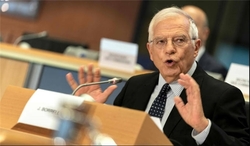 European Union Minister for Foreign Affairs Josep Borrell in a phone conversation with Iran’s Foreign Minister Mohammad Javad Zarif criticized Washington for sanctions which have targeted the Iranian people’s health and life amid the coronavirus outbreak.
European Union Minister for Foreign Affairs Josep Borrell in a phone conversation with Iran’s Foreign Minister Mohammad Javad Zarif criticized Washington for sanctions which have targeted the Iranian people’s health and life amid the coronavirus outbreak. RNA - During the phone talks on Friday night, Borrell and Zarif discussed the latest developments related to coronavirus pandemic in the world as well as the obstacles on the way of Iran's fight against the disease.
The officials stressed the need for exposing US economic terrorism and obstacles it creates on the way of Iranian people's fight against coronavirus.
Borrell expressed solidarity with Iran, and rejected the US unilateral sanctions against Iranian people's health and life.
He urged cooperation among the countries to find effective solutions in the field.
The talks were held amid an outcry on national and international levels against US sanctions, with Russia, China, as well as different medical organizations and rights groups urging the administration of US President Donald Trump to lift sanctions against Iran.
The coronavirus COVID-19 is affecting over 170 countries and territories around the world. The virus was first reported in the central Chinese city of Wuhan late last year. It has so far killed more than 11,400 people and infected over 276,000 others globally.
Iran reported on Friday 1,433 fatalities and 19,644 cases of infection. Meanwhile, 6,745 people have recovered.
The Iranian foreign ministry declared that despite Washington’s claims of cooperation to transfer drugs to Iran via the new Swiss-launched payment mechanism, the US is troubling the process amid the coronavirus outbreak in the country.
Although US claims that medicines and medical equipment are not under sanctions, they have practically blocked the transfer of Iran’s financial resources in other countries into the Swiss Humanitarian Trade Arrangement (SHTA), Iranian Foreign Ministry Spokesman Seyed Abbas Mousavi said.
As the death toll from the virus surges, Iran intensifies its preventive safety measures. Closures of schools and universities have been extended for the next two weeks.
The government also imposed travel restrictions, specially on Iran’s north, which is among the red zones. The country has also adopted strict digital health control procedures at airports to spot possible infections.
Health Minister Saeed Namaki announced earlier this month that a new national mobilization plan would be implemented across the country to fight against the coronavirus epidemic and more effectively treat patients.
Namaki said that the plan will include all the 17,000 health centers and the 9,000 medical and clinical centers in all cities, suburban areas and villages.
He added that the plan will include home quarantine, noting that infected people will receive the necessary medicines and advice, but they are asked to stay at home.
Namaki said that people with a more serious condition will stay at the hospitals, adding that the public places will be disinfected, the entries of infected towns and cities will be controlled to diagnose and quarantine the infected cases.
According to Fars News Agency, he added that the necessary equipment and facilities have been provided, expressing the hope that the epidemic would be curbed.
Namaki said that the number of medical laboratories to test coronavirus infection has reached 22, and will increase to 40 soon.
The World Health Organization (WHO) says Iran's response to the virus has so far been up to the mark. Still, it says the US sanctions are a big challenge, and Washington would be complicit in the rising death toll in Iran if it would not remove its sanctions.
The World Health Organization has considered priorities in combating coronavirus and Islamic Republic of Iran obeys and follows up priorities as defined by WHO.
The WHO is dispatching separate delegations to all countries.
847/940